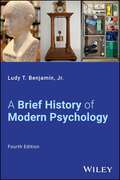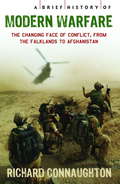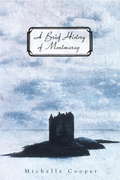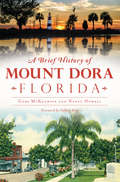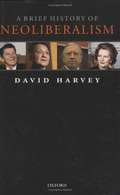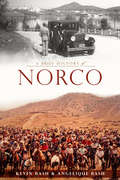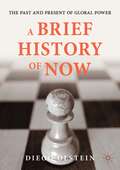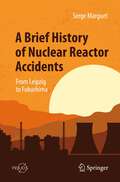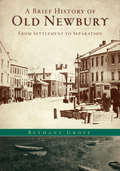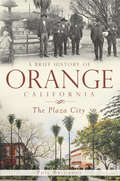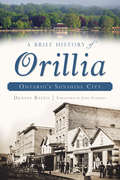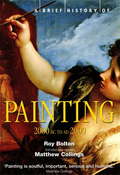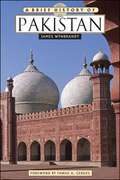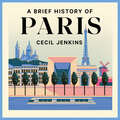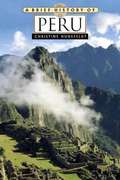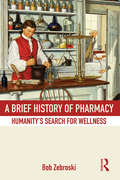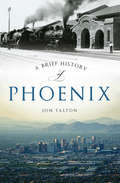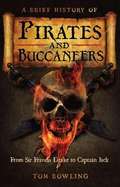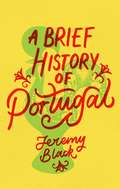- Table View
- List View
A Brief History of Modern Psychology
by Ludy T. Benjamin Jr.A Brief History of Modern Psychology is a clear and engaging account of scientific psychology’s origins, evolution, and related professional practice. With a reader-friendly narrative style, author Ludy Benjamin provides the historical and disciplinary context needed to appreciate the richness and complexity of contemporary psychology. Concise chapters apply biographical and historical context to individual psychologists while exploring pre-scientific psychology, physiology and psychophysics, early schools of German and American psychology, applied psychology, behaviorism, psychoanalysis, cognitive psychology, and more. Thoroughly revised and updated to reflect current scholarship in the field, the fourth edition of A Brief History of Modern Psychology contains new examinations of the connections between phrenology and modern neuroscience, the dangers and proliferation of bogus therapies, industrial psychology, eugenics, intelligence testing, sport psychology, and more. Expanded coverage includes Hermann von Helmholtz’s research on the speed of nerve conductance, Christine Ladd-Franklin’s theory of color vision, Charles Darwin’s theory of natural selection and its widespread influence on psychology, Sigmund Freud’s impact in America, Charles Henry Turner’s pioneering work in comparative psychology, and Evelyn Hooker’s work that led to the removal of “homosexuality” as a mental disorder from the DSM.
A Brief History of Modern Warfare: The changing face of conflict, from the Falklands to Afghanistan
by Richard ConnaughtonSince Vietnam, both the way we fight and our reasons for going to war have become much more complex.The importance of a conflict is determined not by its size or by the numbers of combatants involved but by its ripple effects and its influence upon future events. In a series of thrilling recreations of eight of the most significant encounters of the last three decades, military historian Richard Connaughton presents a fascinating insight into modern warfare, including interviews with some of the major figures. The conflicts include Goose Green in the Falklands, the invasion of Grenada, Operation Desert Storm - the first Iraq War, Operations in Mogadishu as immortalized in the book and film Blackhawk Down, the Siege of Gorazde and Operation Barras in Sierra Leone, as well as more recent events at Fallujah, Iraq, and in Helmand Province, Afghanistan. Richard Connaughton has interviewed most of the major figures involved in each of the conflicts and offers powerful insights into why battles either work or don't. This book will tell you what warfare means in the contemporary world and how it can affect tomorrow.
A Brief History of Modern Warfare: The changing face of conflict, from the Falklands to Afghanistan (Brief Histories)
by Richard ConnaughtonSince Vietnam, both the way we fight and our reasons for going to war have become much more complex.The importance of a conflict is determined not by its size or by the numbers of combatants involved but by its ripple effects and its influence upon future events. In a series of thrilling recreations of eight of the most significant encounters of the last three decades, military historian Richard Connaughton presents a fascinating insight into modern warfare, including interviews with some of the major figures. The conflicts include Goose Green in the Falklands, the invasion of Grenada, Operation Desert Storm - the first Iraq War, Operations in Mogadishu as immortalized in the book and film Blackhawk Down, the Siege of Gorazde and Operation Barras in Sierra Leone, as well as more recent events at Fallujah, Iraq, and in Helmand Province, Afghanistan. Richard Connaughton has interviewed most of the major figures involved in each of the conflicts and offers powerful insights into why battles either work or don't. This book will tell you what warfare means in the contemporary world and how it can affect tomorrow.
A Brief History of Montmaray
by Michelle Cooper“There’s a fine line between gossip and history, when one is talking about kings. ” Sophie Fitzosborne lives in a crumbling castle in the tiny island kingdom of Montmaray with her eccentric and impoverished royal family. When she receives a journal for her sixteenth birthday, Sophie decides to chronicle day-to-day life on the island. But this is 1936, and the news that trickles in from the mainland reveals a world on the brink of war. The politics of Europe seem far away from their remote island—until two German officers land a boat on Montmaray. And then suddenly politics become very personal indeed. A Brief History of Montmarayis a heart-stopping tale of loyalty, love, and loss, and of fighting to hold on to home when the world is exploding all around you. “Once in a while, a special book will cross our paths and make us grateful for life and the ability to read. I’m talking aboutA Brief History of Montmarayby Michelle Cooper. I’m calling her Australia’s next stroke of literary brilliance. ”—Viewpoint From the Hardcover edition.
A Brief History of Mount Dora, Florida (Brief History)
by Nancy Howell Gary MckechnieMount Dora is known for its southern charm and New England look, yet its history is just as engaging. The "Festival City" began with the arrival of pioneer families such as the Drawdys, Simpsons and Tremains. In the 1880s, it became a popular destination for Chautauqua events, when visitors gathered beside Lake Gertrude and Lake Dora for educational and cultural enrichment. In the twentieth century, Mount Dora weathered economic setbacks and racial conflict before becoming a premier city of the arts. Today, this beautiful lakefront community welcomes thousands of visitors to its numerous festivals, events and active shopping village. Join authors Gary McKechnie and Nancy Howell as they celebrate the intriguing history of their town.
A Brief History of Neoliberalism
by David HarveyNeoliberalism - the doctrine that market exchange is an ethic in itself, capable of acting as a guide for all human action - has become dominant in both thought and practice throughout much of the world since 1970 or so. Its spread has depended upon a reconstitution of state powers such that privatization, finance, and market processes are emphasized. State interventions in the economy are minimized, while the obligations of the state to provide for the welfare of its citizens are diminished. David Harvey, author of 'The New Imperialism' and 'The Condition of Postmodernity', here tells the political-economic story of where neoliberalization came from and how it proliferated on the world stage. While Thatcher and Reagan are often cited as primary authors of this neoliberal turn, Harvey shows how a complex of forces, from Chile to China and from New York City to Mexico City, have also played their part. In addition he explores the continuities and contrasts between neoliberalism of the Clinton sort and the recent turn towards neoconservative imperialism of George W. Bush. Finally, through critical engagement with this history, Harvey constructs a framework not only for analyzing the political and economic dangers that now surround us, but also for assessing the prospects for the more socially just alternatives being advocated by many oppositional movements.
A Brief History of Netherlands
by Paul F. StateArranged chronologically, this history describes Dutch urban development during the middle ages, Holland's economic growth after independence from Spain, the establishment of a parliamentary government, its role during the world wars, and the country's reconstruction after World War II. Recommended for public and college libraries. Annotation ©2008 Book News, Inc., Portland, OR (booknews.com)
A Brief History of Norco (Brief History)
by Kevin Bash Angelique BashLegend has it that Rex Clark won fifteen square miles of failed farms, rutted roads and broken water mains in a poker game. Using his wife's newspaper fortune, Clark tried orchards and then poultry. Local hot springs inspired Clark's creation of a giant recreational resort. U.S. presidents and Hollywood royalty sojourned at the fabulous Norconian until the Great Depression hit. The spa was converted to U.S. Naval Hospital #1 during World War II and then a top Cold War missile lab. Norco became a horse-raising enclave while staving off annexation from nearby southwestern Riverside County cities. Today, the city is known nationwide as HorseTown, USA. Join former mayor Kevin Bash and his coauthor daughter Angelique Bash for this engaging trail ride through Norco's colorful past.
A Brief History of Now: The Past and Present of Global Power
by Diego OlsteinExploring the rise and fall of global power from the mid-nineteenth century, this book tracks the long and interrelated trajectories of the most serious challenges facing the world today. Although at first the urgency of the coronavirus outbreak in 2020 seemed to take precedence over other global problems such as socioeconomic inequality and climate change, it has ultimately exacerbated these issues and created opportunities to address them boldly and innovatively. A Brief History of Now provides a bird’s-eye view of world hegemony, economic globalization and political regimes as they have evolved and developed over the last two hundred years, providing context and insights into the forces which have shaped the Western world. Presented in an accessible and engaging narrative, the book addresses key contemporary challenges and explores the repercussions of a technological revolution, the potential instability of democracy over the coming years, and the urgent struggle to tackle climate change. With his book, Diego Olstein helps to answer pressing questions about our world today and provides a roadmap for analysing future trajectories.
A Brief History of Nuclear Reactor Accidents: From Leipzig to Fukushima (Springer Praxis Books)
by Serge MarguetAre you afraid of a nuclear reactor accident? Should you be? This book will arm you with the scientific knowledge necessary to make a rational and informed opinion on the subject, without having to be an expert in nuclear physics. Written so that a non-specialist can easily approach the highly technical aspects, it looks at all significant nuclear reactor accidents since the dawn of the Atomic Age and brings to light many crucial details that rarely, if ever, appear in the general media. Serge Marguet, an internationally renowned expert in reactor physics, breaks down the must-know technical aspects of numerous nuclear reactor accidents throughout history — both famous and unknown — from the first ever nuclear accident in Leipzig to the Chernobyl explosion and, finally, the Fukushima affair and its most recent developments. With many high-quality photographs and diagrams, this book is essential reading for anyone concerned about nuclear safety, curious about nuclear reactors, or simply interested in the history — and future — of nuclear power.
A Brief History of Old Newbury: From Settlement to Separation
by Bethany GroffIn the first ten years of its settlement, the town of Newburywitnessed murders, kidnappings, earthquakes and a plague of caterpillars. The century that followed--marked by religious conflict, Indian uprisings and public scandal--proved no less challenging to the early Puritan community.In 1640, Massachusetts Governor John Winthrop noted, "Aspeople increased, so sin abounded." But through the turmoil, Newbury's citizens harnessed the region's abundant natural resources and developed a thriving community. Author Bethany Groff introduces the compelling personalities that shaped the history of Old Newbury up until 1764, when Newburyport received its independence from the mother town. From the scandalous exploits of Dr. Henry Greenland to the courageous and sacrificing acts of founding families like the Emerys, Dummers and Pikes, A Brief History of Old Newbury provides a captivating glimpse into the verve of thisearly New England town.
A Brief History of Orange, California: The Plaza City
by Phil BrigandiOrange, California, a city that started small, but grew big on the promise, sweat and toil of agriculture. Born from the breakup of the old Rancho Santiago de Santa Ana, its early days were filled with horse races, gambling, and fiestas. Citrus was the backbone of the economy for more than half a century, though post-war development eventually replaced the orange groves. Historian, and Orange native, Phil Brigandi traces the roots of the city back to its small town origins: the steam whistle of the Peanut Roaster, the citrus packers tissue-wrapping oranges for transport, Miss Orange leading the May Festival parade, and the students of Orange Union High painting the O and celebrating Dutch-Irish Days. In doing so, he captures what makes Orange distinct.
A Brief History of Orillia: Ontario's Sunshine City (Brief History)
by John Forrest Dennis RizzoLocal author Dennis Rizzo tells the fascinating and diverse history of Orillia, Ontario. First populated by the Huron, Iroquois and Chippewa Nations, Orillia is now a well-loved, year-round recreation destination. Its history is deeply tied to its water. Situated in the narrows where Lake Simcoe flows into Lake Couchiching, Orillia was a gathering place for centuries before Europeans used it to bring furs to market. Sir John Simcoe, first governor of Upper Canada, fostered permanent settlement of the area. A gateway to the Muskoka region, it has been home to lumber, manufacturing, and artistic endeavours. Today, summer cottagers and winter athletes alike enjoy the Sunshine City and its more than twenty annual festivals. Local author Dennis Rizzo tells the fascinating and diverse history of Orillia, Ontario.
A Brief History of Painting: 2000 BC to AD2000
by Roy BoltonThe urge to create pictures of our world has been with us ever since early man daubed a fingerful of pigment on a rock, or used primitive colours to create exquisite images of the beasts he hunted - images so breathtakingly powerful they have never been surpassed, however sophisticated we have become. This book tells the story of what painting has meant to us, and how its role has changed over the centuries. In the crisp, unstuffy commentary on each of 150 landmark works, Christie's art expert Roy Bolton leads us through the development of painting until our own age, where painting as a painterly craft has been overtaken by a proliferation of new forms introduced by contemporary art. To the question, 'Is the death of painting upon us?' the introductory chapter by Matthew Collings, the multi-award-winning TV art presenter, art historian and cultural critic, gives an inspiring answer: 'Painting justifies itself. Rather than pathetically struggling to keep up with the new freak-show culture of videos and installations, painting will only be worth having if it reconnects with its own inner life, where the old and the new are the same.' Roy Bolton's selection takes us from the Ancient World, via the Italian Renaissance, Rococo and Classicism to Impressionism, Modernism and the Contemporary World. Each painting, with its context and artist, is explained in terms designed to encourage us to judge art for ourselves. Written with authority and full of original and helpful insights, this is a history of art for our times. 'While I find it interesting to think about all sorts of art, I prefer painting to any of it. Painting is soulful, important, serious and humane.' Matthew Collings 'We need to de-mystify art by stripping it down to its bare essentials, then rebuilding it ourselves, using our own minds and eyes, without all the pompous clutter.' Roy Bolton
A Brief History of Painting: 2000 BC to AD2000 (Brief Histories)
by Roy BoltonThe urge to create pictures of our world has been with us ever since early man daubed a fingerful of pigment on a rock, or used primitive colours to create exquisite images of the beasts he hunted - images so breathtakingly powerful they have never been surpassed, however sophisticated we have become. This book tells the story of what painting has meant to us, and how its role has changed over the centuries. In the crisp, unstuffy commentary on each of 150 landmark works, Christie's art expert Roy Bolton leads us through the development of painting until our own age, where painting as a painterly craft has been overtaken by a proliferation of new forms introduced by contemporary art. To the question, 'Is the death of painting upon us?' the introductory chapter by Matthew Collings, the multi-award-winning TV art presenter, art historian and cultural critic, gives an inspiring answer: 'Painting justifies itself. Rather than pathetically struggling to keep up with the new freak-show culture of videos and installations, painting will only be worth having if it reconnects with its own inner life, where the old and the new are the same.' Roy Bolton's selection takes us from the Ancient World, via the Italian Renaissance, Rococo and Classicism to Impressionism, Modernism and the Contemporary World. Each painting, with its context and artist, is explained in terms designed to encourage us to judge art for ourselves. Written with authority and full of original and helpful insights, this is a history of art for our times. 'While I find it interesting to think about all sorts of art, I prefer painting to any of it. Painting is soulful, important, serious and humane.' Matthew Collings 'We need to de-mystify art by stripping it down to its bare essentials, then rebuilding it ourselves, using our own minds and eyes, without all the pompous clutter.' Roy Bolton
A Brief History of Pakistan
by James WynbrandtWynbrandt, a writer and journalist, explores the historical precedents and events that have placed Pakistan firmly in the center of the global war on terror, an ideological conflict between dictatorship and democracy, and between secular and Islamic rule. This brief account touches on a number of topics, including the young country's people, its tumultuous past, the Islamization of Pakistan, Pakistan during the rule of Pervez Musharraf, the country's nuclear weapons program, and its relations with the United States, Afghanistan, and India. Annotation ©2009 Book News, Inc., Portland, OR (booknews.com)
A Brief History of Paris
by Cecil JenkinsParis: city of love, food and fashion. Paris: the city that played host to major historical and cultural dramas. Paris: a modern metropolis. Paris is all of these, all at once, all the time. There is a unique fusion of past and present in this purposefully grand and well-planned city. The Triumphal Way, which runs straight from the Louvre through the Tuileries Gardens, across the Place de la Concorde - where the guillotine once stood - through the Arc de Triomphe towards the Arche de la Défense and into the modern business district is just one example of the many eras that remain present. Famously a city for walkers, Paris has echoes of its history at every turn. Wandering through Montmartre, you will discover the birthplace of the energetic cancan at the Moulin Rouge; stroll around Montparnasse and see the haunts of American writer Ernest Hemingway; observe the striking new Opéra de la Bastille, which stands in the same place as the notorious prison.To walk in Paris is to walk in history. Cecil Jenkins recounts the often turbulent history with due attention to social conditions and cultural development as well as to the political events that shaped the city. It is the colourful story of a city emerging to modernity through repeated conflicts, both internal and regional: a struggle between piety and passion, prince and peasant, against competing countries in Europe.
A Brief History of Paris
by Cecil JenkinsParis: city of love, food and fashion. Paris: the city that played host to major historical and cultural dramas. Paris: a modern metropolis. Paris is all of these, all at once, all the time. There is a unique fusion of past and present in this purposefully grand and well-planned city. The Triumphal Way, which runs straight from the Louvre through the Tuileries Gardens, across the Place de la Concorde - where the guillotine once stood - through the Arc de Triomphe towards the Arche de la Défense and into the modern business district is just one example of the many eras that remain present. Famously a city for walkers, Paris has echoes of its history at every turn. Wandering through Montmartre, you will discover the birthplace of the energetic cancan at the Moulin Rouge; stroll around Montparnasse and see the haunts of American writer Ernest Hemingway; observe the striking new Opéra de la Bastille, which stands in the same place as the notorious prison.To walk in Paris is to walk in history. Cecil Jenkins recounts the often turbulent history with due attention to social conditions and cultural development as well as to the political events that shaped the city. It is the colourful story of a city emerging to modernity through repeated conflicts, both internal and regional: a struggle between piety and passion, prince and peasant, against competing countries in Europe.
A Brief History of Paris
by Cecil JenkinsParis: city of love, food and fashion. Paris: the city that played host to major historical and cultural dramas. Paris: a modern metropolis. Paris is all of these, all at once, all the time. There is a unique fusion of past and present in this purposefully grand and well-planned city. The Triumphal Way, which runs straight from the Louvre through the Tuileries Gardens, across the Place de la Concorde - where the guillotine once stood - through the Arc de Triomphe towards the Arche de la Défense and into the modern business district is just one example of the many eras that remain present. Famously a city for walkers, Paris has echoes of its history at every turn. Wandering through Montmartre, you will discover the birthplace of the energetic cancan at the Moulin Rouge; stroll around Montparnasse and see the haunts of American writer Ernest Hemingway; observe the striking new Opéra de la Bastille, which stands in the same place as the notorious prison.To walk in Paris is to walk in history. Cecil Jenkins recounts the often turbulent history with due attention to social conditions and cultural development as well as to the political events that shaped the city. It is the colourful story of a city emerging to modernity through repeated conflicts, both internal and regional: a struggle between piety and passion, prince and peasant, against competing countries in Europe.
A Brief History of Peru
by Bill HarrisHunefeldt (history, U. of California, San Diego) traces the history of Peru from its ancient civilizations established around the second millennium B.C.E. to the present day. Coverage includes the Inca Empire; colonial Peru; the Bourbon reforms; the Wars of Independence during the late-18th and early-19th centuries; the early decades of the 20th century, characterized by economic depression and conflicts; dictatorships and reform in the mid-20th century; the agrarian reform and the Shining Path, during the 1960s, 70s, and 80s; and new structures and leadership during the past decade. The appendices include basic facts about Peru, a chronology, an extensive bibliography, and a list of recommended reading grouped by topic. Academic but accessible to the general reader. Annotation ©2004 Book News, Inc., Portland, OR (booknews.com)
A Brief History of Pharmacy: Humanity's Search for Wellness
by Bob ZebroskiPharmacy has become an integral part of our lives. Nearly half of all 300 million Americans take at least one prescription drug daily, accounting for $250 billion per year in sales in the US alone. And this number doesn't even include the over-the-counter medications or health aids that are taken. How did this practice become such an essential part of our lives and our health? A Brief History of Pharmacy: Humanity's Search for Wellness aims to answer that question. As this short overview of the practice shows, the search for well-being through the ingestion or application of natural products and artificially derived compounds is as old as humanity itself. From the Mesopotamians to the corner drug store, Bob Zebroski describes how treatments were sought, highlights some of the main victories of each time period, and shows how we came to be people who rely on drugs to feel better, to live longer, and look younger. This accessible survey of pharmaceutical history is essential reading for all students of pharmacy.
A Brief History of Phoenix
by Jon TaltonThough the new metropolis is one of America's largest, many are unaware of Phoenix's rich and compelling history. Built on land once occupied by the most advanced pre-Columbian irrigation society, Phoenix overcame its hostile desert surroundings to become a thriving agricultural center. After World War II, its population exploded with the mid-century mass migration to the Sun Belt. In times of rapid expansion or decline, Phoenicians proved themselves to be adaptable and optimistic. Phoenix's past is an engaging and surprising story of audacity, vision, greed and a never-ending fight to secure its future. Chronicling the challenges of growth and change, fourth-generation Arizonan Jon Talton tells the story of the city that remains one of American civilization's great accomplishments.
A Brief History of Pirates and Buccaneers
by Tom BowlingFrom Stevenson's Treasure Island to Pirates of the Caribbean, the romantic image of pirates in popular culture has long been with us. But pirates are not all as charming as Johnny Depp. In ancient times Thracians, Cilicians and Illyrians terrorised traders in the Mediterranean, while the Barbary pirates of North Africa instilled fear wherever they went from the Holy Lands to the coast of Ireland. It was not until the age of Discovery, when ships began to cross the Atlantic carrying unimaginable riches from the New World that the traditional image of the buccaneering pirate was created. In England, heroes such as Sir Francis Drake were feted for their exploits against the Spanish fleet in which piracy was little more than state-sponsored terrorism. Tom Bowling's lively history explores many of the myths and true stories about the notorious outlaws of the oceans: including Captain Kidd, Blackbeard as well as Mary Read and other famous female pirates.
A Brief History of Portugal: Indispensable for Travellers
by Jeremy BlackThis is a comprehensive history of Portugal that covers the whole span, from the Stone Age to today. An introduction provides an understanding of geographical and climatic issues, before an examination of Portugal's prehistory and classical Portugal, from the Stone Age to the end of the the Roman era.Portugal's history from ad420 to the thirteenth century takes in the Suevi, Visigoths and Moors. Then, a look at medieval Portugal, covers the development of Christian Portugal culminating with the expulsion of the Moors, with a focus on key sites. A subsequent section on Spanish rule, between 1580 and 1640, explains why Spain took over and why Spanish rule collapsed.There is a significant focus on Portugal's global role, particularly during the age of exploration, or expansion, in the fifteenth century to 1580: Manueline Portugal, Henry the Navigator, Vasco da Gama and Belém. Portugal was the first of the Atlantic empires, with territory in the Azores, Madeira, West Africa and Brazil, and it remained a major empire until the 1820s, retaining an African empire until the 1970s. It's empire in Asia - in Malacca, Macao, Goa and Timor - continued even longer, until the 1990s. Black shows how Portugal had a global impact, but the world, too, had an impact on Portugal. Baroque Portugal, between 1640 and 1800, is explored through palaces in Mafra, Pombal and elsewhere and the wealth of Brazil. The nineteenth century brought turmoil in the form of a French invasion, the Peninsular War, Brazilian independence, successive revolutions, economic issues and the end of the monarchy.Republican Portugal brought further chaos in the early years of the twentieth century, then the dictatorship of Salazar and its end in the Carnation Revolution of 1974. Portugal's role in both world wars is examined, also its wars in Africa. From the overthrow of autocracy to a new constitution and the leadership of Soares, contemporary, democratic Portugal is explored, including the fiscal crisis of recent years. Throughout Black introduces the history and character of the country's principal regions, including the Azores, Madeira and the Cape Verde Islands. He looks at key national sites, at Portuguese food and wine and the arts, with special sections devoted to port, Portugal's famous tiles and the university established at Coimbra in 1290.
A Brief History of Portugal: Indispensable for Travellers
by Jeremy BlackThis is a comprehensive history of Portugal that covers the whole span, from the Stone Age to today. An introduction provides an understanding of geographical and climatic issues, before an examination of Portugal's prehistory and classical Portugal, from the Stone Age to the end of the the Roman era.Portugal's history from ad420 to the thirteenth century takes in the Suevi, Visigoths and Moors. Then, a look at medieval Portugal, covers the development of Christian Portugal culminating with the expulsion of the Moors, with a focus on key sites. A subsequent section on Spanish rule, between 1580 and 1640, explains why Spain took over and why Spanish rule collapsed.There is a significant focus on Portugal's global role, particularly during the age of exploration, or expansion, in the fifteenth century to 1580: Manueline Portugal, Henry the Navigator, Vasco da Gama and Belém. Portugal was the first of the Atlantic empires, with territory in the Azores, Madeira, West Africa and Brazil, and it remained a major empire until the 1820s, retaining an African empire until the 1970s. It's empire in Asia - in Malacca, Macao, Goa and Timor - continued even longer, until the 1990s. Black shows how Portugal had a global impact, but the world, too, had an impact on Portugal. Baroque Portugal, between 1640 and 1800, is explored through palaces in Mafra, Pombal and elsewhere and the wealth of Brazil. The nineteenth century brought turmoil in the form of a French invasion, the Peninsular War, Brazilian independence, successive revolutions, economic issues and the end of the monarchy.Republican Portugal brought further chaos in the early years of the twentieth century, then the dictatorship of Salazar and its end in the Carnation Revolution of 1974. Portugal's role in both world wars is examined, also its wars in Africa. From the overthrow of autocracy to a new constitution and the leadership of Soares, contemporary, democratic Portugal is explored, including the fiscal crisis of recent years. Throughout Black introduces the history and character of the country's principal regions, including the Azores, Madeira and the Cape Verde Islands. He looks at key national sites, at Portuguese food and wine and the arts, with special sections devoted to port, Portugal's famous tiles and the university established at Coimbra in 1290.
